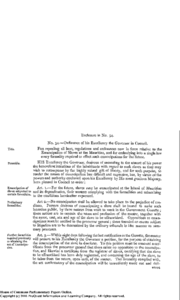Full Transcript
Ordinance of his Excellency the Governor in Council.
For repealing all laws, regulations and ordinances now in force relative to the Emancipation of Slaves at the Mauritius, and for embodying into a single law every formality required to effect such emancipations for the future.
HIS Excellency the Governor, desirous of seconding to the utmost of his power the benevolent intentions of the inhabitants with regard to such slaves as they may wish to recompense by the highly valued gift of liberty, and for such purpose, to render the means of emancipation less difficult and expensive, has, by virtue of the powers and authority conferred upon his Excellency by His most gracious Majesty, been pleased in Council to order;
Art. 1.—For the future, slaves may be emancipated at the Island of Mauritius and its dependencies, their masters complying with the formalities and subscribing to the conditions hereinafter expressed.
Art 2.—No emancipation shall be allowed to take place to the prejudice of creditors. Persons desirous of emancipating a slave shall be bound to make such intention public, by three notices from week to week in the Government Gazette; these notices are to contain the name and profession of the master, together with the name, cast, sex and age of the slave to be affranchised. Oppositions to emancipations must be notified to the procureur general; those founded on causes subject to litigation are to be determined by the ordinary tribunals in like manner as summary processes.
Art. 3.—Within eight days following the last notification in the Gazette, the master will present to his Excellency the Governor a petition, for the purpose of obtaining the emancipation of the slave in due form. To this petition must be annexed a certificate from the procureur general that there exists no opposition to the emancipation, and likewise a certificate from the registrar of slaves, certifying that the slave to be affranchised has been duly registered, and containing the age of the slave, to be taken from the return, upon oath, of the master. This formality complied with, the act confirmatory of the emancipation will be immediately made out and delivered gratis. This act is to be registered, (gratis also,) within the delay of one month, in the registry of the Court of First Instance, at the office of the civil commissary of the quarter wherein the emancipated slave shall reside, at the police-office of Port Louis, at the slave registry office, and wherever else it may be found necessary. The documents relative to the emancipation are to be taken to and deposited in the registry office.
Art. 4.—Emancipations by will are to be subjected to the formalities prescribed by the preceding articles.
Art. 5.—On the emancipation of any slave of the age of fifty years and upwards, or of any slave afflicted with an infirmity rendering him incapable of obtaining a livelihood, the master shall, upon emancipating, enter into a bond to provide for and maintain such slave as long as the said slave shall live. Every infirmity is to be attested in the town of Port Louis by the chief commissary of police, and in the several quarters by the civil commissaries or their assistants; for this purpose every slave to be emancipated shall be brought before one of the aforesaid public officers.
On the emancipation of any slave under the age of fourteen years, the master, on emancipating, shall enter into a bond to provide for and maintain such slave until he shall have completed his fourteenth year.
In the event of any contravention, on the part of the master, to the terms of the bond in favour of slaves emancipated under the circumstances mentioned in the present article, such master shall, upon proof thereof before the ordinary tribunals, and at the suit of the ministère public, be condemned in a penalty not exceeding the sum of two hundred pounds sterling, nor less than fifty pounds, according to the nature of the case. The amount of the penalty shall be applied to the uses of the affranchised person, and shall for such purpose be deposited in the Caisse de Bienfaisance.
Art. 6.—Children under the age of seven years, born of a slave who shall be emancipated, are to follow the lot of their mother.
Art. 7.—Every master, on emancipating a slave, shall be bound to give such slave a surname, to serve as a family name to his or her descendants for ever.
Art. 8.—All anterior laws and regulations contrary to the dispositions of the present ordinance, are and remain repealed.
And to the end that no person may pretend ignorance of the same, the present ordinance shall be read and registered in the courts; for which purpose a copy thereof shall be presented by the procureur general, to his honor the chief judge and commissary of justice.
GOD SAVE THE KING.
Given at Port Louis, Island of Mauritius, this 14th May 1828.
(signed) G. LOWRY COLE.
By order of his Excellency the Governor.
(signed) A. W. Blane, Acting Chief Secretary to Government.
By order of the Council.
(signed) W. N. Leitch, Secretary to the Council.
A true copy.
(signed) W. N. Leitch, Clerk to the Council.
Date
Location
Citation
"For repealing all laws, regulations and ordinances in force relative to the Emancipation of Slaves at the Mauritius, and for embodying into a single law every formality required to effect such emancipations for the future." Laws of Enslavement and Freedom in the Anglo-Atlantic World, accessed Mar 10, 2025, https://slaveryandfreedomlaws.lib.unb.ca/laws/378
Copy
Download Original
Images published from the ProQuest House of Commons Parliamentary Papers product (HCPP) with permission of ProQuest LLC. Further reproduction is prohibited without permission.
